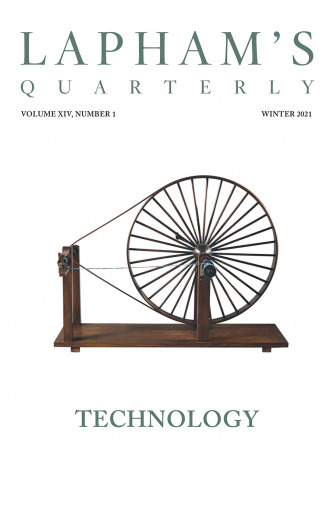Reading makes immigrants of us all. It takes us away from home, but most important, it finds homes for us everywhere.
—Hazel Rochman, 1995Circulation System
Solomon Schindler considers the laws of motion.
Not more than a century has elapsed since the United States of America proudly declared that their domains should forever be kept open as a place of refuge for the oppressed of all nations; since they thus issued a standing invitation to all who believed themselves oppressed by the tyranny of either priest, king, or capitalist to come and share the glorious liberties and privileges with which this republic had presented its citizens.
One short century only—and voices are already heard demanding the passage of laws to impede, restrict, yea, prohibit immigration. Nor is this all: these voices grow louder and louder, demanding even the expulsion of large classes of people who, though born and reared upon American soil, are represented as being strangers, whose presence imperils the safety and prosperity of both the republic and its citizens.
What has caused this reaction? What has caused people to change their minds so abruptly? Is this spirit of hostility toward strangers a token of public health, or is it a morbid extravaganza? Will it spread and develop, or will it vanish as suddenly as it appeared? Is there any possibility of checking the influx of strangers by legislative means, and will it ever come to pass that each race and each nationality will be assigned a separate part of the earth for a habitation, the boundary lines of which they must not overstep?
To arrive at a full understanding of this phenomenon, the field which it covers must be subdivided into several areas, and not before each of these has received an exhaustive examination shall we be able to form a settled opinion. Yet before all, it is necessary to acquaint oneself with the idea that migration is not the voluntary act of man as an individual but his involuntary submission to a law which governs that great organism called mankind; that it is as necessary to its existence and well-being as is the circulation of the blood to the human body or the changing tides to the ocean. The investigation will turn around this first principle as around a pivot. If the migratory habit of people could be traced back to the whims of individuals, means could easily be devised to encourage immigration, in places and at times, where and when benefit could be derived from the influx of newcomers, or to restrict or suppress it wherever and whenever danger lurks behind it; but if it be true that people migrate impelled by instinct, that the migratory habit is a law of nature, or that migration benefits the organism irrespective of the welfare of one or a number of its cells, we might as well attempt to stay the hurricane, which in itself is a migration of the particles which compose the atmosphere, or to check the storm that stirs the sea to its very depth, as to think of stemming the tide of migration whenever or wherever it sets in.
The universe appears to us at first sight a mechanism so complicated and intricate that a thousand various forces seem needed to keep it in running order; yet on closer inspection, it is found that but very few forces are called for to serve that purpose; that these forces are so carefully constructed that they automatically balance each other, and that the very same force which directs the fiery sunball is made to cut and grind the grain of sand which grits under the step of the human foot. The steam, which by its expansion and contraction moves the shaft of the engine up and down, to and fro, is made use of to do a thousand different kinds of work in a large factory; to drive in one room a thousand spindles; to turn in another a circular saw and to lift a hammer in another—thus the very same forces are used in the universe to perform various kinds of work.
It has become a well-established fact that the vast bodies which populate space are kept in motion by two forces; that the one, the centrifugal force, supplies them with the impetus to fly far out from a given center, while the other, the centripetal force, draws them as powerfully toward it. If either of them should overpower the other for one short moment, the equilibrium would be at once destroyed and the body would either fly toward and crash against the center or be hurled at random into space, to meet a fate of which we naturally lack even the dimmest conception.
These same forces, however, manifest themselves not exclusively in the planetary system but are found at work even in the human mind, balancing each other there with the same precision as elsewhere. With all due respect to human individuality, we are but minute cells of the large organism called mankind. In the order of things, the life of the organism receives always greater consideration than the life of the cells. A human being, an animal, a plant, is composed of myriads of cells which die away as rapidly as they have sprung into existence.
It is ever and always humanity, the life of the larger organism, which we must take into consideration when a social question looms up before us, and not of individuals, because it is not man that thinks and feels and moves; it is humanity that thinks and feels in him and moves through him.
Now, while it seems necessary for the preservation of this vast body that its component particles should keep their places for a time, it is as necessary that their position should be shifted and that the locomotion of the cells should be neither too rapid nor too slow; that there should be neither too much rest nor too much restlessness but that each extreme should be automatically counterbalanced and checked by the other. The same centripetal and centrifugal forces are applied exactly in the same manner as they are used to produce regularity in the motion of the planets.
Every cell, every human being, is swayed by them and obeys them involuntarily. While the individual may believe that he is consulting his own welfare by staying where he is, or by seeking another place of residence, he merely follows the pressure brought upon him in either direction by either of these great and universal forces.

Round Lake, Mud Bay, by Tom Thomson, 1915. © Art Gallery of Ontario / Bridgeman Images.
Man is imbued with an undying love of the place where he is born and reared. The earth of one’s fatherland seems softer, its water sweeter, its sky bluer, its air more balmy, its flowers more fragrant, its fruits more nourishing, its men and women more shapely, more honest, and more trustworthy than those of any other land. The native of a desert will find beauty in its monotonous sand waves and would yearn for them even in a paradise. There is a strong tendency in every father, and still more in every mother, to keep their offspring near them. What a happiness when at a holiday the members of a family find themselves collected under the same roof, around the same table, parents, sons, and daughters with their wives and husbands, their children, yea, children’s children!
This sentiment, so strong and lovable, is the manifestation of the centripetal force. Yet if this force were left to itself, stagnation would soon set in. As a body in which the circulation of the blood has ceased becomes mortified and rots away, so would mankind be doomed to die prematurely if its cells were kept forever in the same places.
It appears to many a wonder why some nations have remained on a low plane of civilization while others have reached a high standard of culture, and they seek to solve the problem by denying to these nations the capability of culture. But is their savagery not due, rather, to the fact that, for various reasons, they have remained stationary? May it not be conjectured that if the currents of immigration and emigration had produced a healthy circulation of blood, they might have risen intellectually, morally, and industrially to the same height which is occupied by those nations which have had the opportunity of atomic circulation by migration? Wisely, however, the centripetal force is balanced by the centrifugal force here also.
Behold the yearning of the child to see other places; behold in the youth the eagerness to seek his fortune in far off countries, his belief that the further he goes to seek it, the surer his chances of finding it. Behold our love for all that is strange, and behold the success of the stranger. Has the reader ever chanced to observe that in spite of all the advantage which the native born has over the stranger, in spite of better knowledge of his surroundings, of men and things, it is always the stranger who succeeds? How many families remain and prosper for several generations in the same locality? And if they do, when we reach backward but a few hundred years, we find that the originator of the illustrious house or family has come and settled down—a stranger in these quarters. Migration is a law of nature. As the sea is stirred by the storms, or the atmosphere by the currents of wind, thus are the atoms of which humanity is composed kept in circulation by the innate desire of each to leave its place and seek another abode.

Solomon Schindler
From “Migration a Law of Nature.” Schindler arrived in New York from Germany in 1871 and supported his family by selling shoelaces before becoming the rabbi of a synagogue in Hoboken, New Jersey. He later moved to Boston and lectured on socialism, immigration, and education at the Temple Adath Israel, where, seeking to keep Judaism “abreast with the time and to win for it the respect of the Gentile world,” he worked to purge traditional Jewish mysticism and ritualism from the congregation. After resigning from the pulpit in 1894, he recanted his earlier radicalism in a sermon titled “Mistakes I Made.”

